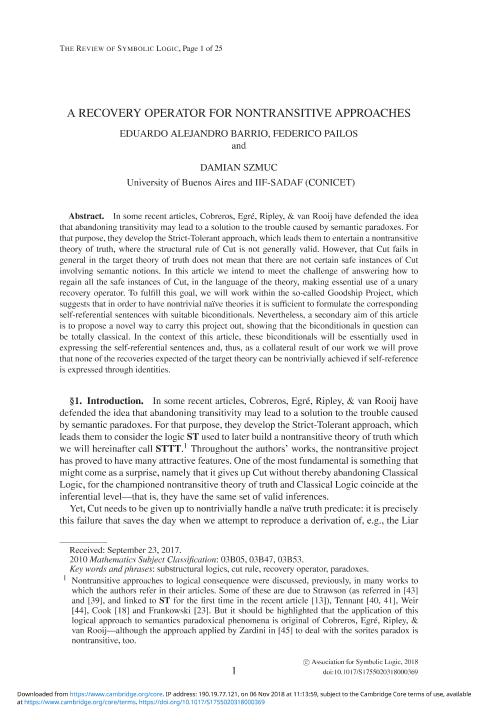Mostrar el registro sencillo del ítem
dc.contributor.author
Barrio, Eduardo Alejandro

dc.contributor.author
Pailos, Federico Matias

dc.contributor.author
Szmuc, Damián Enrique

dc.date.available
2020-01-31T20:24:30Z
dc.date.issued
2018-09
dc.identifier.citation
Barrio, Eduardo Alejandro; Pailos, Federico Matias; Szmuc, Damián Enrique; A recovery operator for non-transitive approaches; Cambridge University Press; Review of Symbolic Logic; 9-2018
dc.identifier.issn
1755-0203
dc.identifier.uri
http://hdl.handle.net/11336/96433
dc.description.abstract
In some recent articles, Cobreros, Egré, Ripley, & van Rooij have defended the idea that abandoning transitivity may lead to a solution to the trouble caused by semantic paradoxes. For that purpose, they develop the Strict-Tolerant approach, which leads them to entertain a nontransitive theory of truth, where the structural rule of Cut is not generally valid. However, that Cut fails in general in the target theory of truth does not mean that there are not certain safe instances of Cut involving semantic notions. In this article we intend to meet the challenge of answering how to regain all the safe instances of Cut, in the language of the theory, making essential use of a unary recovery operator. To fulfill this goal, we will work within the so-called Goodship Project, which suggests that in order to have nontrivial naïve theories it is sufficient to formulate the corresponding self-referential sentences with suitable biconditionals. Nevertheless, a secondary aim of this article is to propose a novel way to carry this project out, showing that the biconditionals in question can be totally classical. In the context of this article, these biconditionals will be essentially used in expressing the self-referential sentences and, thus, as a collateral result of our work we will prove that none of the recoveries expected of the target theory can be nontrivially achieved if self-reference is expressed through identities.
dc.format
application/pdf
dc.language.iso
eng
dc.publisher
Cambridge University Press

dc.rights
info:eu-repo/semantics/openAccess
dc.rights.uri
https://creativecommons.org/licenses/by-nc-sa/2.5/ar/
dc.subject
SUBSTRUCTURAL LOGICS
dc.subject
CUT RULE
dc.subject
RECOVERY OPERATOR
dc.subject
PARADOXES
dc.subject.classification
Filosofía, Historia y Filosofía de la Ciencia y la Tecnología

dc.subject.classification
Filosofía, Ética y Religión

dc.subject.classification
HUMANIDADES

dc.title
A recovery operator for non-transitive approaches
dc.type
info:eu-repo/semantics/article
dc.type
info:ar-repo/semantics/artículo
dc.type
info:eu-repo/semantics/publishedVersion
dc.date.updated
2020-01-31T18:58:49Z
dc.journal.pais
Reino Unido

dc.journal.ciudad
Cambridge
dc.description.fil
Fil: Barrio, Eduardo Alejandro. Consejo Nacional de Investigaciones Científicas y Técnicas; Argentina. Instituto de Investigaciones Filosóficas - Sadaf; Argentina
dc.description.fil
Fil: Pailos, Federico Matias. Consejo Nacional de Investigaciones Científicas y Técnicas; Argentina. Instituto de Investigaciones Filosóficas - Sadaf; Argentina
dc.description.fil
Fil: Szmuc, Damián Enrique. Consejo Nacional de Investigaciones Científicas y Técnicas; Argentina. Instituto de Investigaciones Filosóficas - Sadaf; Argentina
dc.journal.title
Review of Symbolic Logic

dc.relation.alternativeid
info:eu-repo/semantics/altIdentifier/doi/http://dx.doi.org/10.1017/S1755020318000369
dc.relation.alternativeid
info:eu-repo/semantics/altIdentifier/url/https://www.cambridge.org/core/journals/review-of-symbolic-logic/article/recovery-operator-for-nontransitive-approaches/807975918AB8A4B7BA2CA24E58DA91B0
Archivos asociados
